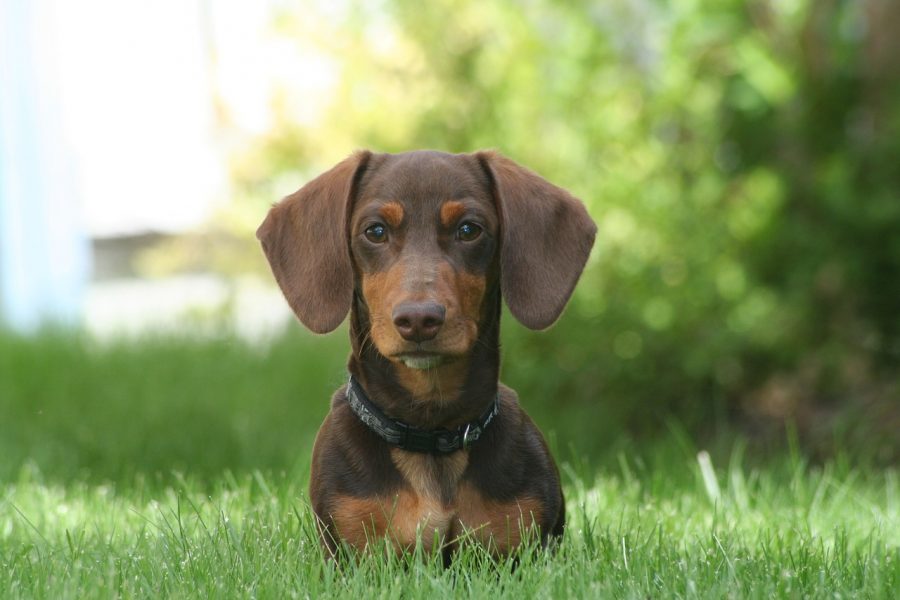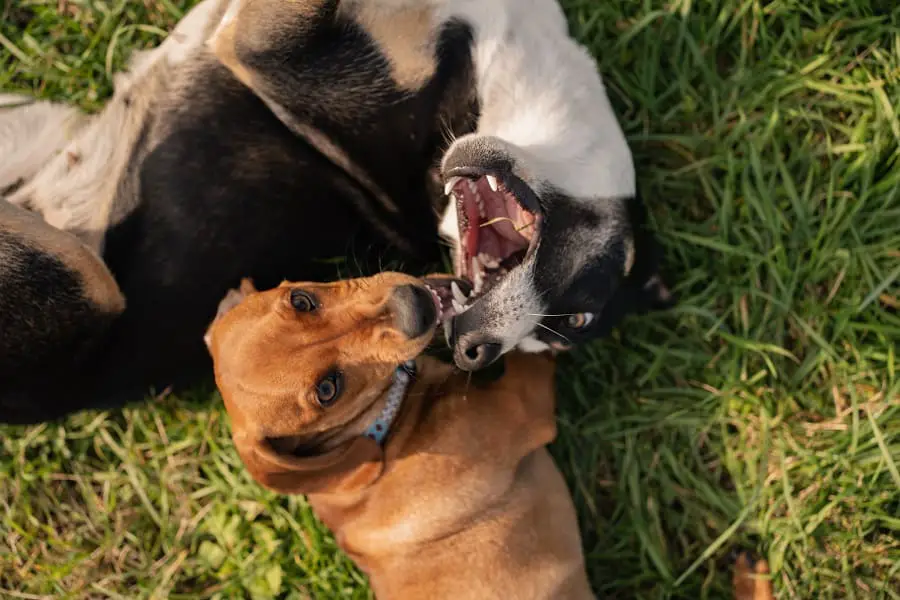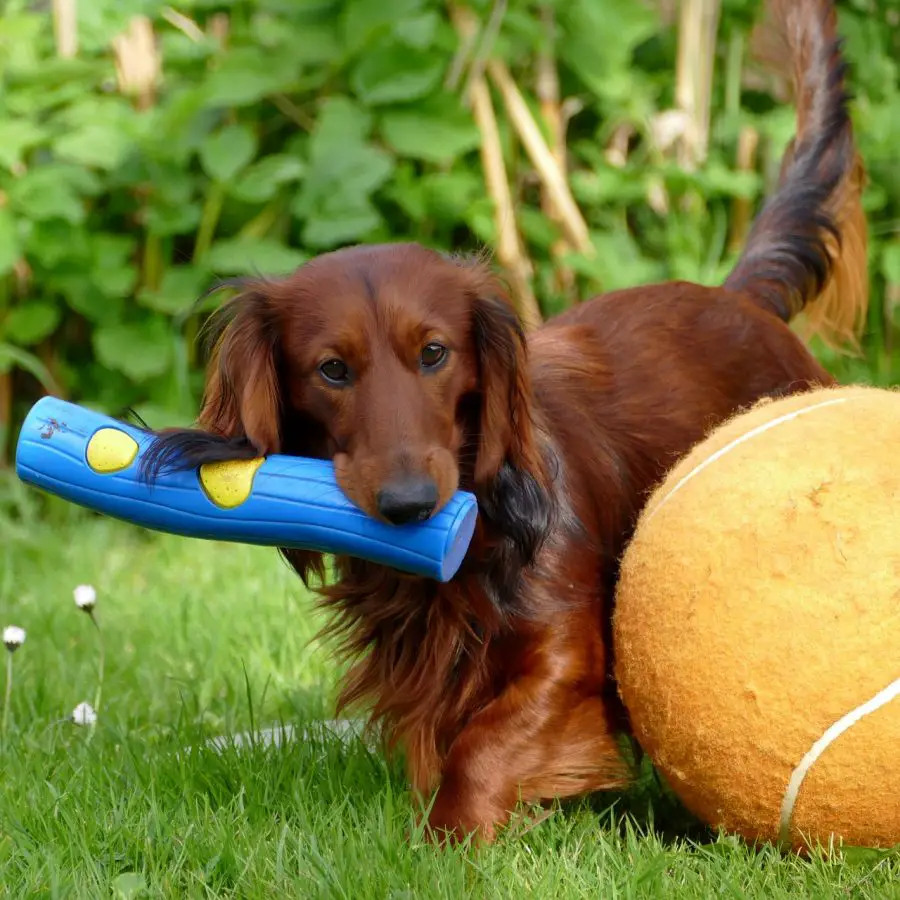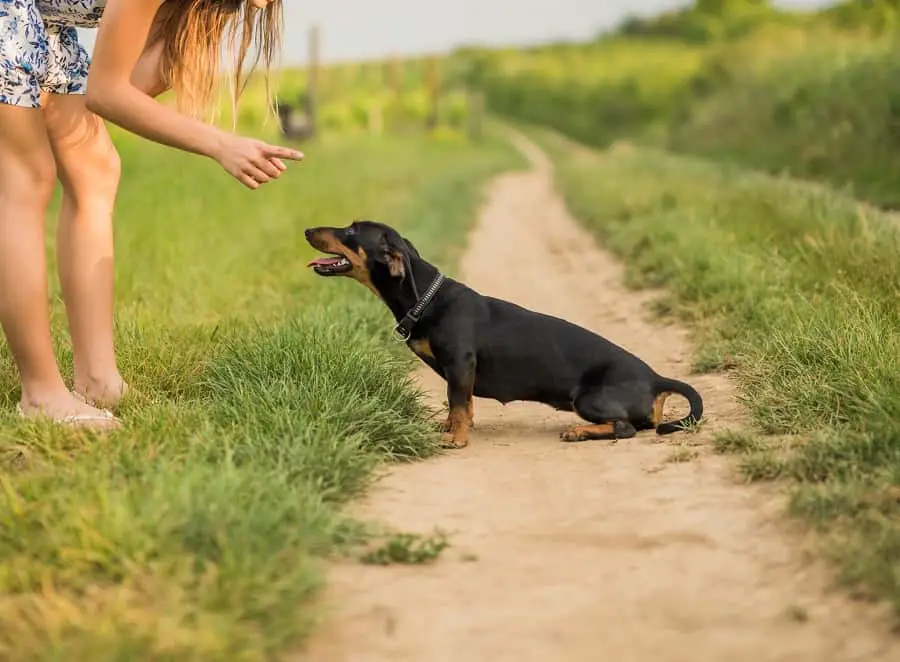Owning a Dachshund is a privilege that owners all over the world enjoy but, as with any pet, there are aspects of this relationship that will need serious work to keep everyone happy.

It is important to remember that these pups were bred to be hunting dogs, and their job was to alert their owners to prey. Dachshunds may be small, but their working instincts still drive them and their behaviors.
Why Do Dachshunds Bite?
It’s commonly known that without adequate training, Doxies will often bark to alert you or scare off intruders, and they will also frequently bite If they are experiencing a strong emotional reaction to a situation.
The key to helping your dog stop this negative behavior is to understand what is causing it. The main factors that cause biting are as follows:
Fear
When your pooch is frightened of something, it is natural for them to want to bite it in a bid to stop it from scaring them.
It’s vital to remember that your beloved pet is a small dog and humans and other dogs will seem very large in contrast.
Many Dachshunds will grow up feeling inadequate and frightened unless they are taught how to behave appropriately from a young age.
Anxiety
Anxiety is common in this breed as they are a pack animal and struggle to be separated from other dogs and people.
Leaving your pooch alone for long periods can result in them developing separation anxiety and, in turn, showing their anxiety about you leaving by biting at you to try and stop you from going.
Aggression

Dachshunds are genetically predisposed to being aggressive stemming from their working roots when they would hunt badgers.
This aggression can be shown towards the ones they love as well as to strangers of any age.
An aggressive dog can become a frequent biter and will only be exacerbated if you respond to negative behavior with negative actions.
Dominance
They may be small and look cute, but what your Dachshund wants more than anything is to be the boss!
When this breed wants to show they are dominant, they will often nip and bite to keep you and others firmly in line. Allowing a Dachshund pup to rule the roost as a pup will only lead to a dog that thinks he is in charge.
Possessiveness
When it comes to owning something, Dachshunds are incredibly possessive.
They will see objects, food and even people as their belongings and will display negative behavior to warn off anyone that gets too close to their things.
If this is not dealt with early on, then you will end up with a pet that attacks anyone they feel is too close to their things.
Territory
Home is where the heart is for Dachshunds, and they are incredibly protective of the space in which they live.
This means that they will often display unwelcoming behavior when anyone new enters their area and this can result in warning people away with barking and biting.
Failing to deal with this from a young age will result in your home becoming an isolated space rather than somewhere, friends and family are warmly welcomed.
How Can I Stop My Dachshund Biting?
It’s not all doom and gloom! While it is essential to understand the reasons behind a dog’s desire to bite, it does not mean they cannot learn a better way of dealing with their emotions.
Owners have to provide the best upbringing for any dog in their care and must help them to grow into a balanced and trustworthy dog.
To help you, we’ve come up with some of the best ways to help a biting Dachshund change their negative behavior.
1 – Training
With any dog, it is vital to train them as soon as is possible. The great news about the Dachshund breed is that they are bright and can pick up new commands easily and from a young age.
The best way to train your dog is to attend puppy training classes where you will learn a wide range of strategies that will help you manage negative behaviors.
Attending regularly and using the skills learned will give your pooch consistency and help them understand the way you expect them to behave at all times.
2 – Treat Them Like a Dog
Many people are tempted to spoil their pups and can sometimes forget that they are a dog, not a baby.
This type of spoiling not only confuses your pet about their place in the family but also stops them from learning how they should behave as they get older.

This does not mean that you shouldn’t lavish love on them, but more that you should do it appropriately.
The key to knowing the difference is to remember that you are a dog owner and not a dog’s mother. Keeping this in mind will help them to grow into confident, non-biting pups.
3 – Positive Reinforcement
If your Dachshund is a biter, then the best way to resolve the issue is to use positive reinforcement to retrain them.
Praising their good behavior and ignoring the negative will help them to learn that you disapprove when they bite.
Sadly, too many owners respond to biting with aggression, and this only proves to reinforce the message that aggression is the way to demonstrate emotions.
Every dog wants to be loved and praised by their owner, and this is much easier for them to achieve when they are shown what you are looking for.
For example, when your dog bites, put them down, make a loud, disapproving noise and ignore them.
They will soon begin to realize that their biting causes this reaction and will stop. When they respond to this training, reward them with lots of fuss and treats so that they learn what it is you want from them.
4 – Consistency
As with everything in life – consistency is the key! If you challenge biting one day but don’t bother the next, your dog will be confused and unable to learn what you expect.
Likewise, if you try positive reinforcement one day but behave aggressively the next, you will hinder the emotional development of your pooch, and this will lead to more biting and negative behaviors.

The best way forward is to decide your method for reprimanding when your Dachshund bites and then sticking to it no matter where you are and no matter what happens.
Owners who doggedly stick to this manta and provide a consistent approach are more likely to have a happier dog that knows it is anti-social to bite.
5 – Redirect
If you have a Dachshund that bites when they are anxious, then redirection could be the key you’ve been looking for.
By immediately changing what you are doing, you will help to reduce their anxiety and allow them to calm down before re-exposing them.
For this technique to work, you must rigidly follow this approach. First, monitor your dog carefully to be aware of any change in behavior.
Next, the moment they begin to display any biting, redirect their attention elsewhere. When they calm, allow them to continue with the first activity, monitoring closely.
You should continue this set of responses until they can cope with the activity without biting at all.
Remember to fuss and treat each time you manage to redirect and stop the biting, and they will soon learn that they can trust you to help them when they are anxious.
6 – Bitter Spray
If you need more help with training your dog to stop biting, then you can employ the use of a pet approved bitter tasting spray that will leave your pooch with a nasty taste in their mouth.
These sprays are made to help owners who have persistent biters and work to out the dog off biting things as they may taste bad.
First, you need to spray an item that you are happy to use for training. Next, get your dog to play with the item. When they start to bite, remove the item with a loud, disapproving noise.
The noise, removal and taste combination should help your dog to understand that biting is not appropriate. If your Dachshund doesn’t bite the toy when you reintroduce it, then praise and fuss your dog.
7 – Get Help
If all else fails, then it is worth getting the advice and expertise of a professional dog trainer.
There is no shame in needing additional help, and sometimes group training classes don’t have the time required to deal with persistent biting problems.
Getting one to one help will mean that your dog will be the centre of attention and the trainer will be able to work with you to find the root cause of the problem.
Once this has been identified, they will work with you to overcome this problem.
Using a professional is essential if your dog is not responding to any of your attempts as there may be a broader issue that needs to be rectified before you will see an improvement in their biting.
Summary
It is clear that while the Dachshund breed are natural biters, they are smart enough to learn to live without this negative behavior in their lives!
Your job as a Dachshund owner is to help them learn the right way to behave from day one.
Despite the cute face and tiny size, a puppy learns best with consistency and positive reinforcement, and it is your job as an owner to deal with any behavior that may grow to be problematic as your pooch gets older.
Training is not only essential in helping set rules and boundaries, but it is the best way to bond with your dog and help him learn that you are the leader of the pack.
Knowing who the boss is will allow your dog to grow in confidence and feel safe in the home, ultimately leading to better behavior and a stronger relationship between you and them.
